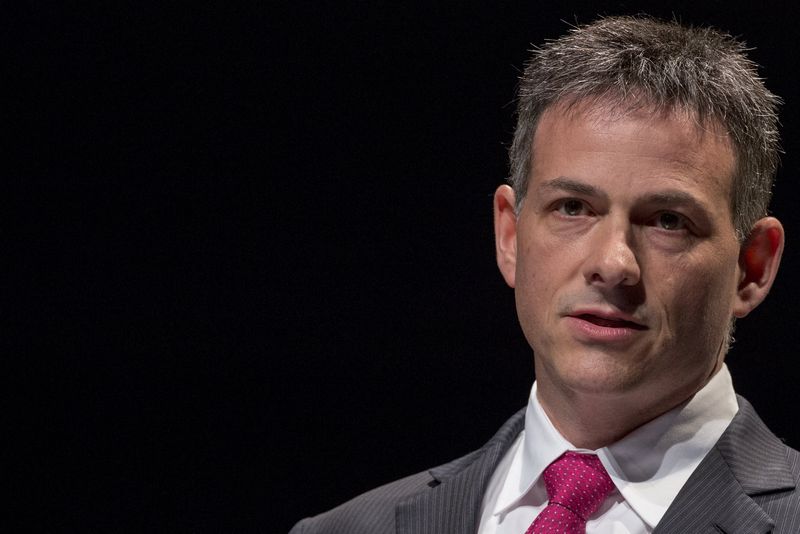By Svea Herbst-Bayliss, Jessica Toonkel and Ashley Lau
NEW YORK (Reuters) - Billionaire hedge fund manager David Einhorn, who often moves a stock simply by speaking its name, on Monday kicked off the year's most prominent investment conference by laying out a case against oil frackers, arguing these companies drill "lots and lots of holes" and burn through plenty of cash.
Einhorn, who often unveils short-bets against companies at these events, cited Pioneer Natural Resources Co as a particular offender at the 20th annual Sohn Investment Conference. "We call it the motherfracker," he said, prompting investors to kick the share price down as much as 5.3 percent. The company should trade closer to $78 a share, he said, not the $166.50 the stock is trading at now.
"Pioneer is burning cash and its reserves are not growing," said Einhorn, who runs $11 billion Greenlight Capital, adding "Pioneer ought to stop touting estimates based on stale pricing." The company is losing 20 cents of present value for every dollar it invests.
Pioneer shares closed Monday at $168.33 a share, down 1.88 percent.
Einhorn also mentioned EOG Resources Inc (NYSE:EOG), which he called the "father fracker," Concho Resources, Whiting Petroleum Corp and Continental Resources Inc.
Last year Einhorn unveiled a short bet against athenahealth Inc at a previous Sohn conference and was the first to underscore problems at Lehman Brothers months before the investment bank filed for bankruptcy.
Einhorn was one of the few investors at the conference who unveiled a short bet, as most other investors put forth ideas that investors can buy and hold.
Leon Cooperman and David Tepper talked about markets and sought to soothe investors fearful that the long-running equities bull market might be over.
Tepper, founder of Appaloosa Management, shocked markets a year ago by warning that investors should not be too long in the stock market. On Monday, he said that investors should not be "too long bonds, not too short stocks" and warned that investors should be careful with commodity investments.
Investors at this conference, even the billionaires, are told to keep it short and talk no more than 15 minutes. Tepper who didn't use all of his time joked that he would sell some of his unused minutes to Bill Ackman, who is known for speaking at a breakneck pace to race through dozens and dozen of slides.
Cooperman, who runs Omega Advisors and has long been saying the stock market would continue to climb, stuck by his bullish outlook, saying the stock market can still end higher this year. "If there is a bubble out there, it is not in the stock market," Cooperman said, adding it may be in the fixed income market.
He pitched a handful of U.S.-based companies including Google Inc (NASDAQ:GOOGL), Dow Chemical Co, Priceline Group Inc and drugmaker Actavis (NYSE:ACT) Plc.
Picking up on the pharmaceutical industry theme, Larry Robbins, who runs Glenview Capital Management, touted AbbVie Inc (NYSE:ABBV), saying the stock price could double. The company's price is relatively cheap and management is disciplined, Robbins said.
Even though AbbVie called off a planned $55 billion takeover of Shire late last year, industry analysts are still holding out forecasts that the breakneck pace of mergers and acquisitions in the pharmaceutical industry will continue. The company could be taken over or it could be the one taking over someone else, Robbins said.
Ackman, founder and chief executive of Pershing Square Capital Management LP, talked about his most recent addition to the portfolio: Canadian pharmaceutical company Valeant Pharmaceuticals International Inc (NYSE:VRX), which he called "massively undervalued." He said companies that buy up others at a steady pace are often misunderstood and said Valeant, which announced plans to buy Salix earlier this year, is an early stage Berkshire Hathaway (NYSE:BRKa), referring to Warren Buffett's company.
Keith Meister, a former Carl Icahn lieutenant who now runs $8 billion Corvex Management, focused on fast food restaurant chain Yum Brands, saying his firm is one of the five largest investors and that the company is Corvex's second-biggest investment ever. On Friday Daniel Loeb's Third Point said it had taken a significant stake in Yum.
Meister said Yum should spin off its China business, allowing a fully independent China company that appeals to the nation's large middle class. He said Yum's share could trade at least at $130, compared with the current price of $92.25, after the company spins off the China operation.

A Yum spokeswoman said the company welcomes input from shareholders in trying to enhance shareholder value and added "In any event, our focus is to get our China business back on track."
(with additional reporting by Sam Forgione in New York; Editing by Steve Orlofsky and Jennifer Ablan)